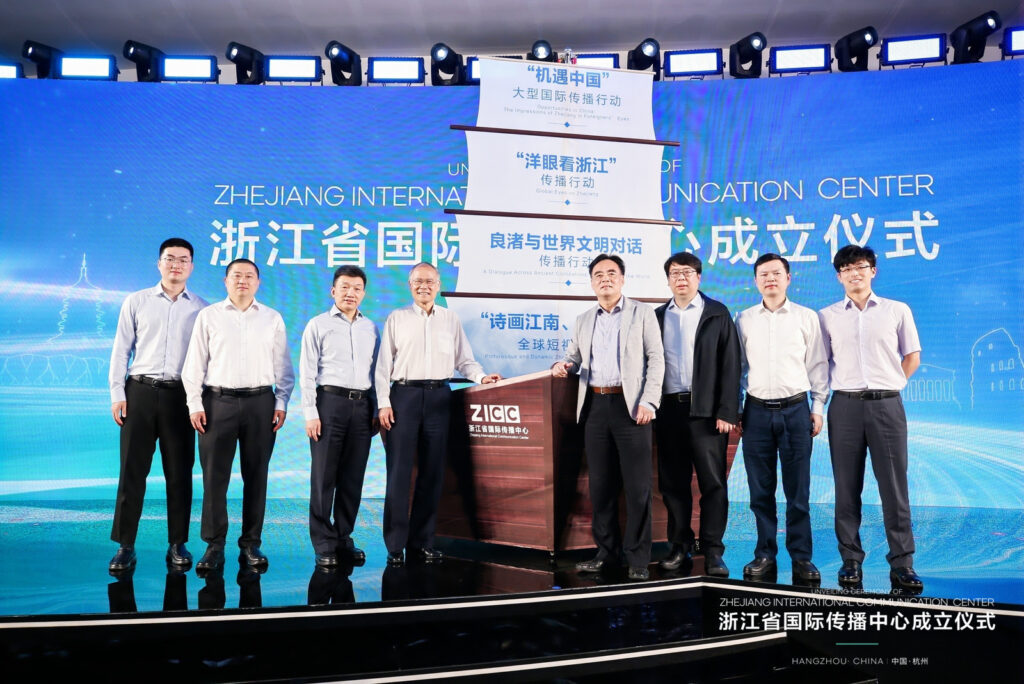
International communications centers, or ICCs, are sprouting up all over China. These centers, a crucial piece in the leadership’s bid to remake its external propaganda matrix, have opened in nearly every province and dozens of cities nationwide. Their spread has been expansive — but far from even. One province, coastal Zhejiang, now hosts 16 “local international communication centers” (地方国际传播中心) at the municipal level or lower — five times the national average.
Zhejiang is one of China’s wealthiest provinces, but this alone cannot account for its surge in new ICCs. Even wealthier provinces, like neighboring Jiangsu and Fujian, have not experienced similar growth. So why has Zhejiang become home to so many ICCs?
Act Globally
As we have detailed in previous research, provincial-level ICCs are spearheading efforts to “innovate” foreign-directed propaganda under a new province-focused strategy, responding to instructions issued by Xi Jinping in 2018. The idea is for central powers to mobilize the peripheries to contribute more actively to the work of what Xi calls “telling China’s story well.”
Since 2021, when Xi Jinping held a collective study session of the Politburo on external communication, there has been a renewed push to strengthen the PRC’s “discourse power” abroad and to shore up what it calls “external propaganda” (外宣), by building a network of provincial and city-level ICCs. In June 2023, provincial and city-level ICCs created a mutual association to better coordinate work nationwide. The process of integrating the ICCs, both horizontally and vertically, including with central state media, has begun to emerge as a core strategy in China’s efforts to remake its infrastructure for global media and public opinion influence abroad.
ICCs, which deliver content to overseas audiences who do not pay for it, are not money-making ventures. “Their operations cannot be separated from the financial support of government bodies like the Propaganda Department,” writes one researcher for Young Journalists Magazine (青年记者杂志). The same article quotes an ICC employee in Chongqing who says that this lack of commercial viability, coupled with irregular government funding, has held back their work. Demand for international communication at the municipal level, they say, “still needs to be cultivated.”
Think Locally
The same does not appear to be true a thousand kilometers to the east. Local governments in Zhejiang are flush with cash to spend on “culture, travel, sports, and media.” Looking at media reports on the province’s ICCs, there also seems to be a perception that money spent on ICCs will be returned through increased trade and tourism — that apart from making the political goals set by Xi, they will act as publicity bureaus for the localities where they are based. In Xianju county, local officials have tasked their ICC with turning the undeveloped region, known as a natural beauty spot, into “a world-class travel destination.” In Hangzhou’s Yuhang district, a local ICC was launched to spread awareness of the neolithic Liangzhu culture it once nurtured.

Compared to inland Chongqing, Zhejiang is deeply plugged into the global economy: from “world capital of small commodities” and New Silk Road terminus Yiwu to tech hub Hangzhou — home to e-commerce giant Alibaba and a mecca for online influencers — and thriving sea ports like Ningbo-Zhoushan, the world’s busiest port by cargo tonnage and home to its own ICC. At the launch ceremony for Yiwu’s ICC, emphasis was less on inspiring affection for the Chinese government abroad and more on “enhancing economic and trade exchanges” with other countries. Other cities like Wenzhou also have strong connections with diasporic communities worldwide. The President of the Chinese Association in Italy — which is home to a thriving community of migrants from Wenzhou — was present at the launch for the city’s ICC. When provincial capital Hangzhou’s ICC was unveiled, speakers hailed Zhejiang as both a crucial node for international trade and a “major overseas Chinese affairs province” (侨务大省) — meaning that a larger proportion of Zhejiang natives are living, working and trading outside the country.
The answer to the question of why Zhejiang has launched so many more ICCs than any other province defies easy explanation. It is likely a combination of the various factors: more funds, more extensive overseas connections — and perhaps even the fact that Xi Jinping spent three and a half years as a top leader in the province. But the rapid spread of ICCs in Zhejiang suggests that while the top-down mandate to remake international communication is a factor, their setup is more than just a response meant to accommodate central government demands. Across the board, the centers promise to bring real, tangible benefits, suggesting they are not just performative political stunts but potential business opportunities. Whatever the balance of these factors may be, they are a reminder that even in China’s push for greater global influence, it continues to be local conditions and opportunities that matter the most.




















